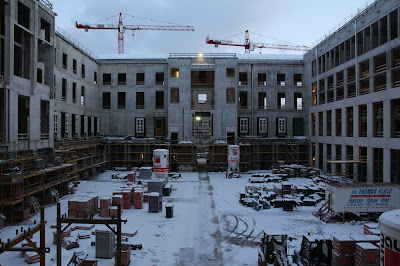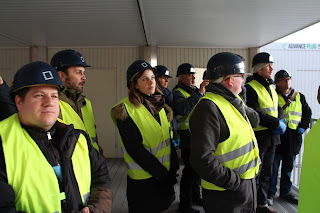Wednesday, 13 April 2016
Insider goes to Check Point Alpha
Here are some fotos from a recent Insider guides' foray to the
German-German border crossing point Marienborn/Alpha. This was a major
East/West crossing point where the DDR controlled all traffic
through their territory and en route to Berlin. This is an
expansive 35 hectare complex with access to many original buildings
which retain their authenticity and are now being used for excellent
exhibitions (although unfortunately not all in English). This
complex once employed 1.000 with millions of people controlled here over a 45 year period, some unwittingly with X-ray.
Oh, how Europe has changed!
Friday, 22 January 2016
Field trip to the Humboldt Forum
Insider guides got a sneak preview into the bowels of Berlin's 'new
city palace (Stadtschloss) this week. Our indomitable guide,
Christian, was at pains to explain that this is indeed no new
palace, but instead 'The Humbolt Forum'. Unwilling to rebuild an
icon of the monarchy, the German state would pay only for something
else, to use for matters of state and visiting
dignitaries/delegations. The Prussian trappings would have to be
funded by the City of Berlin and private donations.
This has led to the project being a sum of compromises between government functionality and the visions of those harking of days gone by. Still, it is getting done, not like our new airport. Oddly enough the results to date are quite striking. The traditional and the modern blend nicely. There are huge rooms for receptions, even a small concert hall, and enough space for Dahlem's fantastic Ethnological museum to move there in 2019. There will of course also be some shops.
The views from the Forum over the historical centre are outstanding. One thinks that despite some Berliners reservations about this new building it might just indeed become a roaring success.
This has led to the project being a sum of compromises between government functionality and the visions of those harking of days gone by. Still, it is getting done, not like our new airport. Oddly enough the results to date are quite striking. The traditional and the modern blend nicely. There are huge rooms for receptions, even a small concert hall, and enough space for Dahlem's fantastic Ethnological museum to move there in 2019. There will of course also be some shops.
The views from the Forum over the historical centre are outstanding. One thinks that despite some Berliners reservations about this new building it might just indeed become a roaring success.
Thursday, 12 November 2015
A fresh face, chatting with Phil
With winter approaching, what are
your plans, the to-do-list of getting acquainted with Berlin
during its long, dark months?
Surviving is high on that list. This will be my first winter in Berlin and I've been told to prepare for something quite grim and cold, but
having moved from Ireland I'm surely well suited, they are two of our
main exports. A fact which may explain the current imbalance in
relations between our two countries. Another priority during those long
dark winter months is staying active. The tendency at this time of
year is to over consume- in all areas- and do less but it's something
I'm keen to avoid. If for no other reason than I'll quickly take on the
physical appearance of a melted candle.
Aside from those two relatively unambitious goals, I really want to immerse myself in the language by taking courses. In school I had the option to
study Spanish or German. As I was deciding which, I vividly remember
uttering the words 'I'll never live in Germany', before going with
Spanish! Berlin is also a centre of ideas and I'd like to become more
acquainted with some of the groups that organise and campaign
for alternative solutions to some of the big issues of the day. Before I
left home I was becoming a bit more politically conscious and engaged
and I'd like to continue down that path, in a city of enormous
importance.
What Berlin lacks in 8000m peaks, it more than makes up for in 8000mm teaks. Actually, they're tropical and not native to Berlin so that doesn't quite work, for lots of reasons but the backspace on my keyboard is broken so it stays. No, this is not the place for climbers! I have sampled some of the indoor walls the city has to offer but the real satisfaction has always been that time in the outdoors. A beautiful setting, good company, a rope, some (climbing) gear and a crag. The fulfilment at the end of a day on the hills is impossible to get at an indoor wall, sadly! In every other facet of life Berlin is immensely satisfying but that is one void I've yet to fill. Unless there is an undiscovered fault line running under the city it's likely to always remain very flat, certainly for the duration of my stay here. I've made my peace with that.
May I probe the subject of how you ended up moving to Berlin
anyway? How does one working in a museum in Dublin come about a life opportunity in Germany? Are you enjoying working outdoors,
touring through the city as a living museum?
I moved
to Berlin for a woman. Very cliché, isn't it? While in Dublin I met a
student of Humboldt University doing her internship and here I am. Ira
is originally Siberian, a fact which bemused my mother who thought only
bears and wolves live there. We were quite fortunate finding an
apartment and are nicely settled in leafy Wilmersdorf. I've usually
lived in places next to cars propped up on bricks and areas filled with
hooded youths masquerading as urban jedis so this has been an
interesting change of scenery. Berlin's parks are wonderful and
I'm right next to one with lots of ping pong tables and plenty of other
facilities. Those small details make a huge difference. Walking through
the city on a daily basis, I'm always amazed how much it's been through,
a living museum, like you say. Everyday I feel like I'm discovering and
understanding more, bit by bit, day by day. I can't think of a better
way to gain that understanding than leading others through the city.
Many of our guides have commented on the spirit of Berlin, its
freedom and creativity and general vibe of nonconformity. I just discovered an illustrator who visualises those quirks which make Berlin so unique, those things that perhaps become 'normal' after a few years, but are definitely not the norm beyond the city limits.
With you having moved here fairly recently, can you share with us
one of those moments where you thought, 'ahhh this is beautiful and
strange and it only could happen in Berlin'. I think you know what
I mean, If not, call me crazy and skip the question!
Yes! There have been so many of those moments that only feel possible
in this city. The one that leaps to mind happened very soon after moving
here. Myself and Ira were wandering around Ostkreuz and stumbled upon a
protest around the issue of housing on the grounds of an old derelict,
abandoned warehouse. An interesting collection of individuals and groups
in attendance- anarchists, environmentalists and so on. It was all very
typical and standard but just as it appeared to be coming to an end a
convoy of trucks pulled up and the protest hit the streets. Huge numbers
joined in as they crawled along the busy roads while pumping techno
music from enormous speakers which were mounted on top! The atmosphere
was incredible and it felt absolutely unique to Berlin. Definitely one
of those moments when I felt privileged to live in such a weird and
wonderful place.
Your enthusiasm is contagious Phil, thank you!
Labels:
berlin,
berlin history,
berlin tour guides,
berlin walking tours,
protest,
rock climbing,
Wilmersdorf
Wednesday, 30 September 2015
Germany's Reunification, 25 years later
With this BIG holiday just around the corner, I thought I would share some articles which put Germany's reunification into perspective. Catch up with this reading list, and then celebrate with confidence on Saturday!
 |
East Berliners go west on November 11, 1989.
Source: AP
|
By Klaus Wiegrefe
When the Berlin Wall fell in
November 1989, nobody expected Germany to be reunified less than a year
later. New documents released by the Foreign Ministry in Berlin shed new
light on the dramatic negotiations that led to East and West Germany
becoming one.
Reunification Renovations: A Massive Facelift for Eastern Germany
By Solveig Grothe
During a trip to East Germany
in 1990, photographer Stefan Koppelkamm discovered buildings that had
survived both the war and the construction mania of the East German
authorities. Ten years later, he returned to photograph the buildings
again. The comparison threw up some unexpected contrasts.
'Two million fewer people in former East' since German reunification
More than 25 years after the fall of the Berlin Wall, official
statistics show two million fewer people live in the former East German
states. Eastern states' economies are still weak in comparison with
western ones.
Germany 25 years after the Berlin Wall: 5 charts shown its transformation
By
Sara Sjolin
Labels:
east germany,
economic growth,
german holiday,
or not,
reunification
Thursday, 13 August 2015
Olympic Village Day Tripping
 |
| one of the smaller cottage-like sleeping quarters |
 |
| House of the Nations canteen |
 |
| Hindenburghaus |
Elstal was located in East Germany and the Olympic village was used by the Soviet Army. A series of pre-fab buildings were added. The army resided here until 1992 when they officially withdrawal from German soil.
 |
| housing, now without windows or doors, Soviet era I believe |
 |
| more of a villa looking building on the premises |
 |
| housing, Soviet? |
 |
| another view of the House of Nations canteen |
 |
| 4,000 sportsmen slept and trained here. Woman were not allowed. The above building must be Soviet era though, the pre-fabricated plattenbau which is very commen throughout former East Berlin. |
more information in German http://www.dkb-stiftung.de/Veranstaltungen_Olympisches_Dorf_2014.130.htm
and an interesting article from our friends at Slow Travel Berlin http://www.slowtravelberlin.com/berlins-olympic-village/
Labels:
1936 olympics,
berlin history,
berlin ruins,
east germany,
nazi architecture,
olympic village,
soviet ruins
Friday, 17 July 2015
summer in Potsdam
 |
| our guide Maria on tour |
Have you been to Potsdam? From April to October you can join Insider on a day trip to this amazing gem of a town less then an hour away from Berlin. As the perfect weather returns I highly suggest you take the time, get out of the city, and discover this UNESCO World Heritage site. Not only is the city incredibly
picturesque, with its many palaces, lakes, manicured gardens, statues
and water fountains dotted over hundreds of green acres, but it is
brimming with an equally fascinating history
Labels:
berlin,
berlin tour guides,
berlin walking tours,
fountains,
palaces,
parks,
Potsdam,
summer
Monday, 25 May 2015
SUMMER
We are VERY busy hosting all our wonderful guests! Hence the delay in posting the next Tour Guide Interview. Please stay tuned, and in the mean time, enjoy a quick peek at the action!
Subscribe to:
Posts (Atom)


















